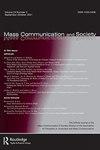社交媒体影响者对心理健康护理帖子的回应:先前经验和追随者参与的调节作用
IF 2.7
2区 文学
Q1 COMMUNICATION
引用次数: 0
摘要
社交媒体上的心理健康信息通常是由普通用户而不是医疗保健专业人员传播的,而这些普通用户中的一部分,即社交媒体影响者,被用作治疗公司的营销来源。根据社会认知理论,影响者关于其积极治疗经历的故事应该鼓励追随者也寻求治疗,而与影响者更强的参与应该会增强这些效果。尽管研究发现,在心理健康治疗等细致入微和污名化的背景下,以前的模仿行为经验可能会削弱替代学习效果,但在理解它如何影响受众对社交媒体上心理健康内容的反应时,分析以前经验的数量和价值是很重要的。本研究检验了一个有调节的中介模型,以帮助解释先前的观看者治疗经验(数量和效价)和与影响者的参与(相似性和副社会关系)对社会认知理论相关结果的影响。结果表明,调节因子之间不存在交互作用,但观影经验和重度精神分裂症结果对结果预期有直接的正向影响,进而正向预测寻求治疗的行为意向。有趣的是,自我效能感对行为意图有负面影响。免责声明作为对作者和研究人员的服务,我们提供了这个版本的已接受的手稿(AM)。在最终出版版本记录(VoR)之前,将对该手稿进行编辑、排版和审查。在制作和印前,可能会发现可能影响内容的错误,所有适用于期刊的法律免责声明也与这些版本有关。披露声明作者报告无竞争利益需要申报。感谢Jessica Gall Myrick博士对这个项目的帮助。图1所示。概念模型显示完整尺寸图2刺激:消极和积极的SMI结果显示完整尺寸图3。h1 - h6b的假设检验注:* p < 0.05, ** p < 0.01, ** p < 0.001。价值观是不标准化的。数量→结果预期:b = 0.008 *, SE = 0.003操纵SMI结果→结果预期:b = 0.40 **, SE = 0.16自我效能感→行为意向:b = -。结果预期→行为意图:b = 0.77 ***, SE = 0.19质量→结果预期:b = 0.39 **本文章由计算机程序翻译,如有差异,请以英文原文为准。
Responses to Mental Health Care Posts by Social Media Influencers: The Moderating Effects of Previous Experience and Follower Involvement
ABSTRACTMental health information on social media is more often communicated by regular users as opposed to healthcare professionals, and a subset of these regular users, social media influencers, are employed as marketing sources for therapy companies. According to social cognitive theory, an influencer’s story about their positive experiences with therapy should encourage followers to also seek therapy, and stronger involvement with the influencer should enhance these effects. Although research has found that previous experience with modeled behaviors may mute vicarious learning effects, with a nuanced and stigmatized context like mental health treatment, it is important to parse out both the quantity and valence of previous experience in understanding how it shapes audience responses to mental health content on social media. The current study tests a moderated mediation model to help explain the impact of previous viewer experience with therapy (quantity and valence) and involvement with the influencer (similarity and parasocial relationship) on social cognitive theory-related outcomes. Results indicate no interaction effects of the moderators, however, there were direct positive effects of previous viewer experience and SMI outcome on outcome expectations, which in turn positively predicted behavioral intentions to seek therapy. Interestingly, self-efficacy had a negative effect on behavioral intentions.DisclaimerAs a service to authors and researchers we are providing this version of an accepted manuscript (AM). Copyediting, typesetting, and review of the resulting proofs will be undertaken on this manuscript before final publication of the Version of Record (VoR). During production and pre-press, errors may be discovered which could affect the content, and all legal disclaimers that apply to the journal relate to these versions also. Disclosure StatementThe author reports there are no competing interests to declare.AcknowledgementThank you Dr. Jessica Gall Myrick for your assistance in the shaping of this project.Figure 1. Conceptual ModelDisplay full sizeFigure 2. Stimuli: Negative vs Positive SMI OutcomesDisplay full sizeFigure 3. Hypothesis Testing of H1-H6bNote: * p < .05, ** p < .01, *** p < .001. Values are unstandardized.Display full sizeQuantity→ Self-Efficacy: b = .007*, SE = .003Quantity→ Outcome Expectations: b = .008*, SE = .003Manipulated SMI Outcome → Outcome Expectations: b = .40**, SE = .16Self-Efficacy→Behavioral Intentions: b = -.43*, SE = .21Outcome Expectations→ Behavioral Intentions: b = .77***, SE = .19Quality → Outcome Expectations: b = .39**
求助全文
通过发布文献求助,成功后即可免费获取论文全文。
去求助
来源期刊

Mass Communication and Society
COMMUNICATION-
CiteScore
6.90
自引率
3.30%
发文量
58
期刊介绍:
Mass Communication and Society" mission is to publish articles from a wide variety of perspectives and approaches that advance mass communication theory, especially at the societal or macrosocial level. It draws heavily from many other disciplines, including sociology, psychology, anthropology, philosophy, law, and history. Methodologically, journal articles employ qualitative and quantitative methods, survey research, ethnography, laboratory experiments, historical methods, and legal analysis.
 求助内容:
求助内容: 应助结果提醒方式:
应助结果提醒方式:


